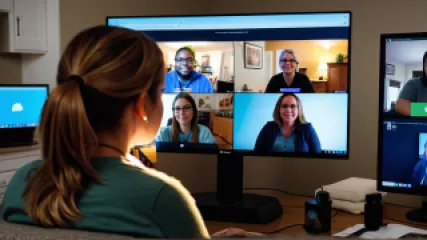Insights from a Virtual Addiction Support Group Member
Insights from a Virtual Addiction Support Group Member
Interviewee: Lillie Foster
Introduction:
As the world becomes increasingly connected through technology, it's no surprise that the internet has become a breeding ground for various forms of addiction. From social media to online gaming, individuals can easily find themselves falling into harmful patterns of behavior. Addiction, whether it be to substances or compulsive behaviors, can have devastating effects on one's life.
In recent years, virtual addiction support groups and online therapy platforms have emerged as a lifeline for those struggling with addiction. These platforms provide individuals with the opportunity to connect with others who are facing similar challenges, share their experiences, and receive support from the comfort of their own homes.
In this interview feature, we gain valuable insights from Lillie Foster, a member of a virtual addiction support group. Lillie opens up about her personal journey, the role of the support group in her recovery, and the benefits of online therapy for overcoming addiction.
Q: Can you share a bit about your background and how you first became aware of your addiction?
A: My name is Lillie Foster, and I'm a recovering alcoholic. My struggles with addiction began in my early twenties when I started using alcohol as a coping mechanism for stress and anxiety. At first, it was just a way to unwind after a long day, but over time, it became a crutch that I couldn't let go of. It wasn't until I hit rock bottom and lost my job that I realized I had a serious problem.
I reached out to a local addiction support group, but attending in-person meetings proved challenging due to my work schedule and transportation issues. That's when I discovered the existence of virtual addiction support groups, and it completely changed my recovery journey.
Q: How did you find the virtual addiction support group that you're a member of?
A: I stumbled upon the virtual addiction support group while doing some research online. I was initially skeptical about joining an online community for something as personal as addiction recovery, but I decided to give it a try. I registered on the platform, and within a few days, I received an email with instructions on how to join the virtual meetings.
It was a bit intimidating at first, but the facilitators and other members made me feel welcome right away. It was comforting to know that there were others out there who understood what I was going through and could offer support without judgment.
Q: What role does the virtual addiction support group play in your recovery?
A: The virtual addiction support group has been an essential part of my recovery journey. It provides a safe space where I can openly discuss my struggles, share my progress, and receive valuable advice from people who have been in similar situations. The connections I've formed with other members have been incredibly meaningful and have helped me feel less alone in my journey.
One of the most significant benefits of the virtual support group is the flexibility it offers. I can attend meetings from the comfort of my own home, eliminating the barriers that often prevented me from participating in traditional in-person meetings. This accessibility has allowed me to maintain consistency in attending meetings and staying connected with my support network.
Q: How does online therapy complement the virtual addiction support group?
A: Online therapy has been a crucial component of my recovery alongside the virtual support group. While the support group provides a sense of community and peer support, online therapy offers a more individualized approach to addressing the underlying causes of addiction.
Through online therapy sessions, I've been able to work with a licensed therapist who understands addiction and can guide me through the process of uncovering and addressing the root causes of my addictive behaviors. It has given me a deeper understanding of myself and helped me develop healthier coping mechanisms.
Q: What advice do you have for individuals considering joining a virtual addiction support group?
A: My advice would be to give it a chance. I understand the hesitation and fear that may come with joining an online community, especially when dealing with something as personal as addiction. However, the benefits far outweigh any initial doubts or concerns.
Virtual addiction support groups provide a unique opportunity to connect with others who truly understand what you're going through. It's a judgment-free zone where you can share your experiences, gain insights from others, and receive support without leaving your home.
Remember, recovery is a journey, and having a strong support system is vital. The virtual addiction support group can be a lifeline during challenging times and a source of inspiration as you navigate the path to recovery.
Conclusion:
The advent of virtual addiction support groups and online therapy platforms has revolutionized the way we approach addiction treatment and recovery. Lillie Foster's insights shed light on the power of these digital communities in providing support, connection, and hope for individuals struggling with addiction.
If you or someone you know is battling addiction, consider exploring the world of virtual addiction support groups and online therapy for overcoming addiction. The path to recovery may be just a click away.






